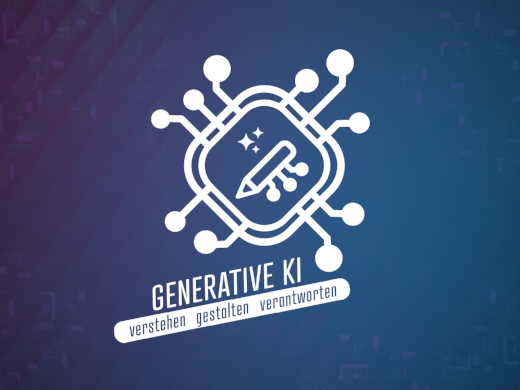


Generative AI: understanding, designing and taking responsibility
University of Graz, Graz University of Technology
Kathrin Otrel-Cass, Martin Ebner, Benedikt Brünner, Dominik Freinhofer, Michael Reicho
About
General Course Information
The MOOC ‘Generative AI: understanding, designing, and taking responsibility’ offers a well-founded and practical introduction to the field of generative artificial intelligence (genAI). In four coordinated learning units and two optional in-depth lessons, participants acquire both theoretical foundations and application-oriented skills to use generative AI technologies in a reflective and responsible manner in their own (working) context.
Content
Course Content
Course topics at a glance:
Lesson 1: Fundamentals of genKI
Introduction to the functionality, architecture and possible applications of generative AI models.
Lesson 2: genKI & creativity
Possible applications of generative AI to support creative processes in the areas of text and images, where its limitations lie and how humans and machines can work together effectively.
Lesson 3: genKI & society
Impact of genKI on society: from art and fake news to political opinion formation.
Lesson 4: genKI & ethics
Raising awareness of the ethical aspects of artificial intelligence: responsibility, fairness, inclusion and autonomy. Discussion of example application scenarios.
Optional in-depth lessons
Lesson 5: Teaching with genKI
Specific didactic applications of genKI in the classroom. Opportunities and challenges in the school context, as well as practical examples for lesson planning.
Lesson 6: genKI in companies
Potential and risks of generative AI in organisations. Practical examples from the business world, legal foundations and recommendations for competence development.
Course Goals
The aim of the course is to enable participants to gain a sound understanding of generative AI technologies, apply them independently and evaluate them critically.
Upon successful completion, participants will be able to:
- explain the basic functioning of generative AI
- use various genKI tools in a targeted manner
- formulate and optimise prompts strategically
- identify and utilise creative fields of application for genKI
- critically reflect on social, legal and ethical implications
- develop concrete application examples for educational or business contexts
- responsibly implement their own ideas and projects with generative AI
Previous Knowledge
No specific prior knowledge is required. The course is aimed at both beginners and those with some initial experience in the field of artificial intelligence. No technical knowledge is necessary - curiosity, openness and an interest in the topic are sufficient.
Course Procedure
The MOOC consists of six lessons. Each learning unit includes:
- short explanatory videos to convey the content
- practical applications and interactive tasks for consolidation
- a forum for discussion, reflection and networking with other participants
- a quiz for self-assessment of the content
Certificate
For actively participating in the course you will receive an automatic certificate which includes your name, the course name as well as the completed lessons. We want to point out that this certificate merely confirms that you answered at least 75% of the self-assessment questions correctly.Research Project
This MOOC was developed as part of the project ‘Prompt Engineering: Impact of AI on Competence Requirements for Education and Business (PeBiWi)’. The project was carried out by the University of Graz, the Teaching/Learning and Digital Transformation department (Institute for Educational Research and Teacher Education) under the guidance of Univ.-Prof. Dr. Kathrin Otrel-Cass, as well as Graz University of Technology and the Educational Technologies organisational unit under the guidance of Priv.-Doz. Dipl.-Ing. Dr.techn. Martin Ebner. The one-year research project from 2024 to 2025 was financed by the Future Fund of the Province of Styria.
Course Instructor
Kathrin Otrel-Cass, Martin Ebner, Benedikt Brünner, Dominik Freinhofer, Michael Reicho
Kathrin Otrel-Cass is a professor at the Institute for Educational Research and Teacher Education at the University of Graz and head of the Teaching/Learning and Digital Transformation department. Her research lies at the intersection of education, technology, and society and is characterized by interdisciplinary approaches. A particular focus is on researching digital transformations in education.
Martin Ebner is head of the service department Educational Technology at Graz University of Technology and therefore responsible for all university wide e-learning activities. He holds an Adjunct Prof. on media informatics (research area: educational technology) and works at the Institute of Human-Centred Computing (HCC) as a senior researcher.
Benedikt Brünner works at the Institute of Human-Centred Computing at Graz University of Technology and is a doctoral candidate in the Future of Digital Education and Learning research project.
Dominik Freinhofer is an AI educator and AI ethicist. As a lecturer in adult and teacher education, he shows users how to use AI effectively and responsibly.
Michael Reicho is a communication scientist and works at the Institute for Educational Research and Teacher Education at the University of Graz. His research interests lie in the field of digital teaching and learning, specifically in the area of digital skills and AI skills. In his dissertation, he explored ways to combat fake news with a focus on school education.
Login & Enrol The course starts on 29 سبتمبر 2025. Currently: 293 Participants
Free for all € 0.00
Partners

University of Graz
Graz

Graz University of Technology
Graz